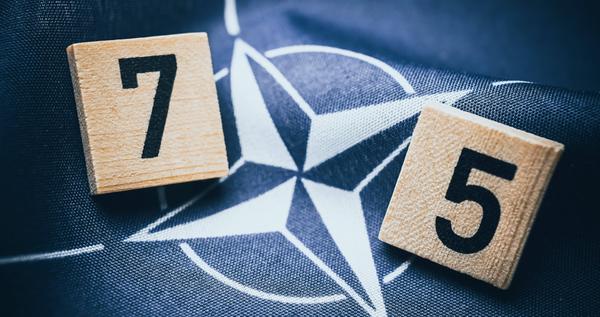NATO at 75: Alliance Evolves Amid Global Challenges marks a significant milestone for the North Atlantic Treaty Organization as it celebrates its 75th anniversary. The recent summit in Washington DC, where the alliance was originally founded, provided a platform for world leaders to reaffirm their commitment to collective defense and address contemporary security challenges. NATO at 75: Alliance Evolves Amid Global Challenges reflects the organization’s journey from its Cold War origins to its current role in an increasingly complex global landscape.
Founded in 1949 by 12 countries, including the United States, United Kingdom, Canada, and France, NATO was initially established to counter the expansion of the Soviet Union in Europe. Its core principle, enshrined in Article 5 of the founding treaty, states that an attack on one member is considered an attack on all. This collective defense agreement has been the cornerstone of NATO’s operations and deterrence strategy for seven and a half decades.
Over the years, NATO has adapted to changing geopolitical realities. Following the collapse of the Soviet Union in 1991, the alliance expanded eastward, welcoming many former Eastern Bloc countries into its fold. This expansion has continued in recent years, with Finland joining in April 2023 and Sweden becoming the 32nd member in March 2024. Both Nordic countries abandoned their long-standing neutrality in response to Russia’s invasion of Ukraine, highlighting the ongoing relevance of NATO in European security.
The recent summit in Washington DC provided an opportunity for NATO leaders to address current challenges and reaffirm their support for Ukraine. US President Joe Biden, in a speech marking the alliance’s anniversary, declared NATO “more powerful than ever.” This statement underscores the organization’s continued importance in maintaining transatlantic security and stability.
One of the key outcomes of the summit was the declaration that Ukraine is on an “irreversible path” towards future NATO membership. This announcement, coupled with promises of increased aid, sends a strong message of support to Kyiv as it continues to defend itself against Russian aggression. The commitment to Ukraine’s eventual membership represents a significant shift in NATO’s stance and reflects the changing security dynamics in Eastern Europe.
UK Prime Minister Sir Keir Starmer was among the world leaders pledging support for Ukraine at the summit. This unified front demonstrates the alliance’s solidarity in the face of external threats and its commitment to protecting democratic values across the Euro-Atlantic area.
While NATO does not possess its own standing army, it serves as a crucial framework for collective military action and defense planning among member states. The alliance has played significant roles in various conflicts and peacekeeping missions, including its intervention in the former Yugoslavia between 1992 and 2004. NATO also coordinates military plans and conducts joint exercises, enhancing interoperability among member forces and strengthening overall defense capabilities.
The expansion of NATO has not been without controversy. Russia has long viewed the alliance’s eastward growth with suspicion and hostility, considering it a threat to its security interests. The recent accession of Finland, which shares a 1,340km border with Russia, and Sweden’s membership have further strained relations between NATO and Moscow.
Looking to the future, NATO faces several challenges. The ongoing conflict in Ukraine remains a central concern, with the alliance walking a fine line between supporting Kyiv and avoiding direct confrontation with Russia. The potential membership of Ukraine, along with other aspirant countries like Bosnia and Herzegovina and Georgia, presents both opportunities and risks for the alliance.
NATO must also grapple with emerging security threats, including cyber warfare, terrorism, and the implications of climate change on global stability. Adapting to these non-traditional challenges while maintaining its core defense capabilities will be crucial for the alliance’s continued relevance and effectiveness.
Another significant challenge is maintaining cohesion among its increasingly diverse membership. With 32 countries spanning North America and Europe, NATO must navigate differing national interests, defense spending commitments, and strategic priorities. The alliance’s ability to forge consensus and act decisively in times of crisis will be critical to its future success.
The 75th anniversary summit also highlighted the need for NATO to address global power shifts, particularly the rise of China. While traditionally focused on European security, the alliance is increasingly aware of the need to consider broader geopolitical dynamics and their impact on transatlantic interests.
As NATO looks ahead to its next 75 years, it will need to continue evolving to meet new challenges while staying true to its founding principles. The commitment to collective defense remains as relevant today as it was in 1949, but the nature of threats and the means to counter them have changed dramatically.
The alliance’s ability to adapt to these changes while maintaining its core values and unity will determine its effectiveness in the coming decades. As global security challenges become more complex and interconnected, NATO’s role as a forum for transatlantic cooperation and a bulwark of democratic values may become even more crucial.
NATO at 75 stands as a testament to the enduring power of collective security and shared values. From its Cold War origins to its current role in addressing 21st-century threats, the alliance has demonstrated remarkable resilience and adaptability. As it faces new challenges and potential expansion, NATO’s commitment to mutual defense and international cooperation will continue to shape the global security landscape for years to come.
Related Articles:
















